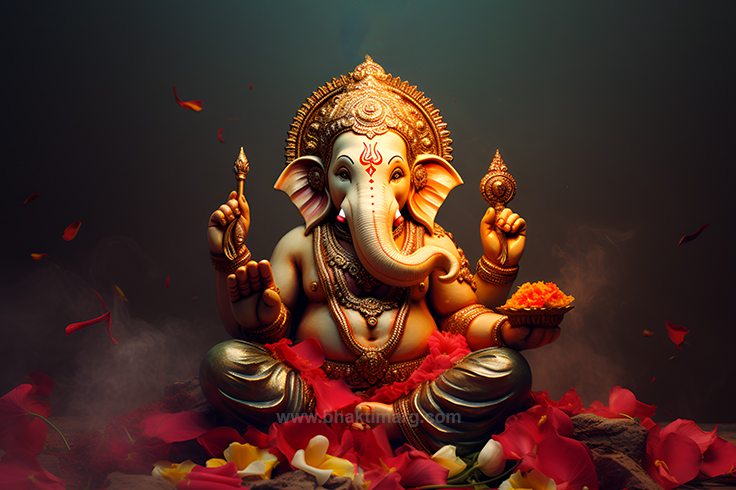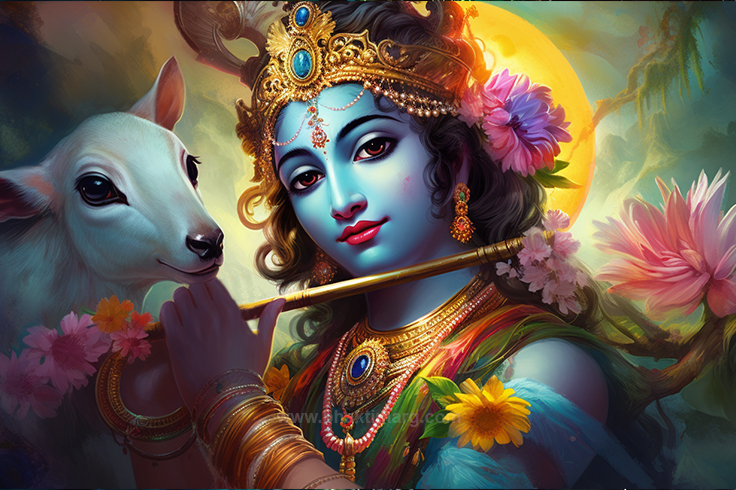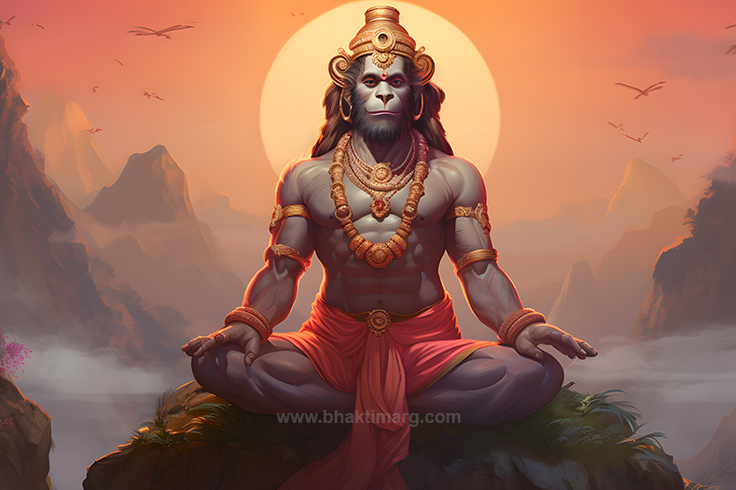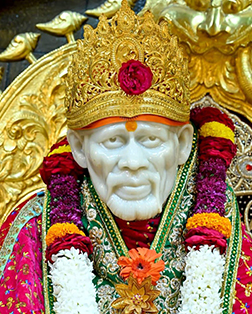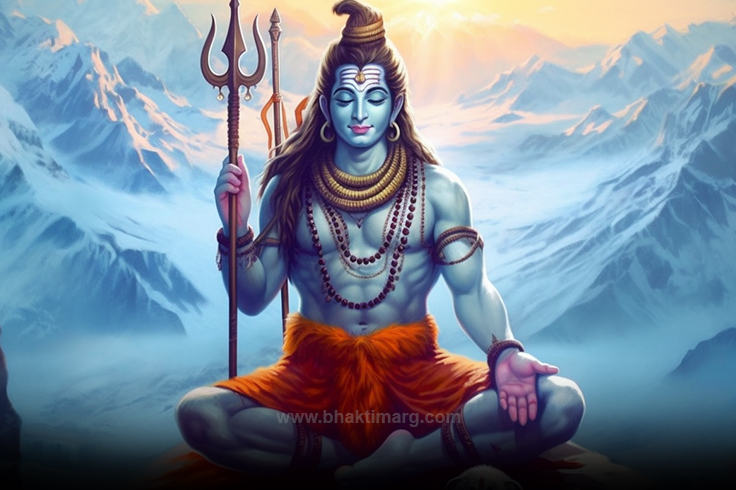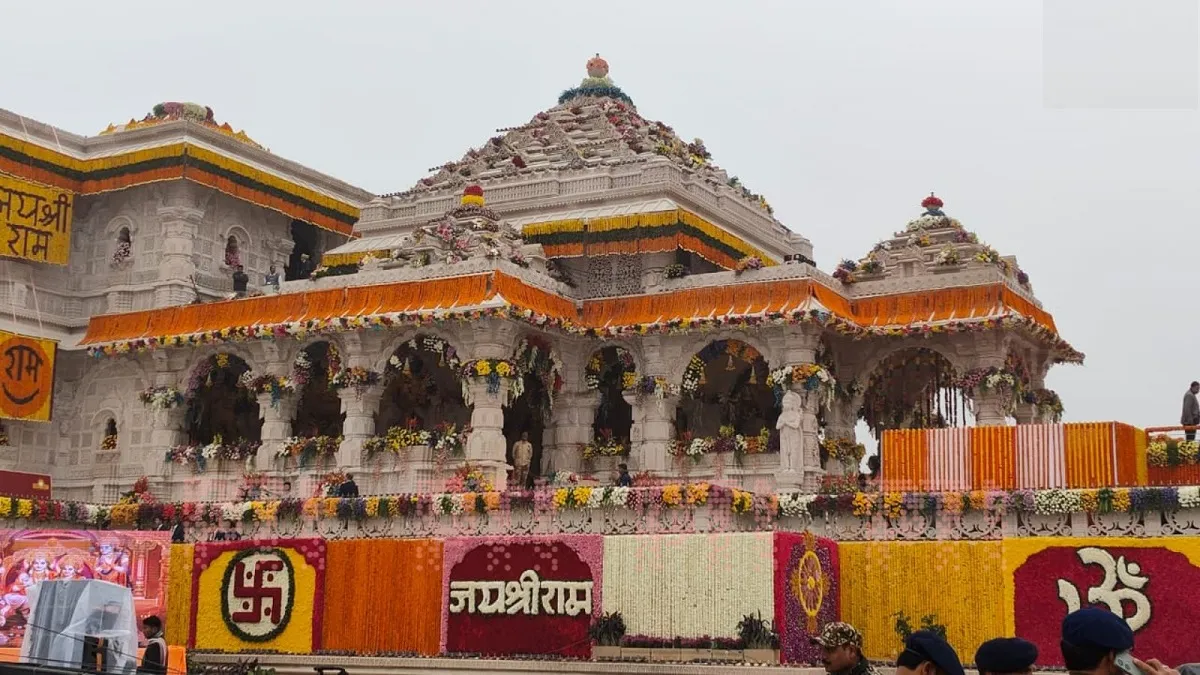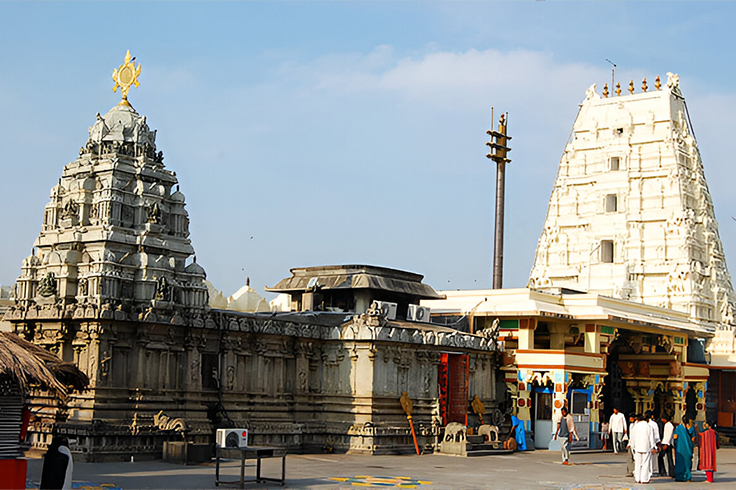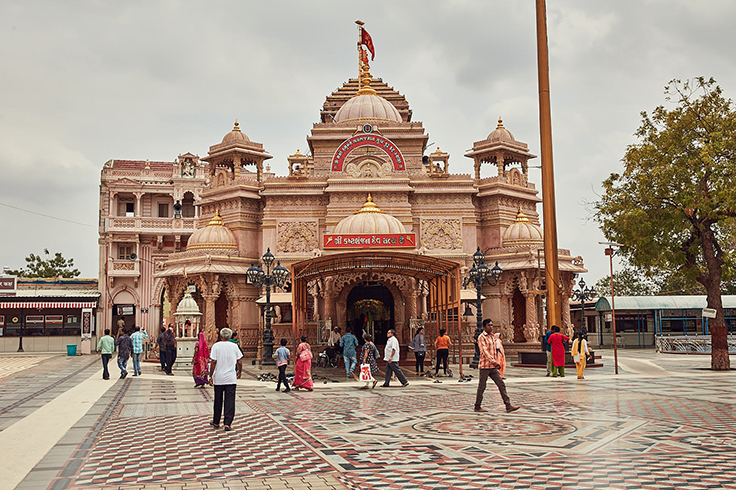Shree Hanuman Stuti Lyrics in English
Anjani Mati Paṭ Lalanam.
Kanchan Nadarik Maniy Vigraham..
Parijat Taru Muul Vasanam.
Bhayami Pavaman Nandanam ..
Gosapadi Kṛtva Risham.
Maski Kṛt Raksham..
Ramayaṇ Maha Malaratnam.
Vande Amiltajam..
Yatr Yatr Raghunath Kṛtanam.
Tatr Tatr Kṛt Mast Kanjalim..
Vaspari Pari Puurṇ Lochanam.
Marutinam Rakshas Santakam..
Anjani Nadanam Viram.
Janaki Shok Nasanam..
Kapikshamak Hantaram.
Vande Lanka Bhayankaram..
Atulitabaladhamam Hemashailabhadeham.
Danujavanakṛshanam Jñaninamagragaṇyam..
Sakalaguṇanidhanam Vanaraṇamadhisham.
Raghupati Priyabhaktam Vatajatam Namami..
Raghupati Priyabhaktam Vatajatam Namami..
..Iti Hanumant Stuti Samapt Jay Siya Ram..
Hanuman Stuti comprises verses and hymns that praise and glorify Hanuman ji and his various qualities, exploits, and role in the epic Hindu scripture called the Ramayana. These hymns are often recited or chanted by devotees to seek blessings, protection, strength, and guidance from Lord Hanuman. Here, at Bakti Marg, we guide you along the road to righteousness so that you can discover divine love. Hanuman Stuti actually refers to an assortment of devotional hymns, prayers, or Hanuman Bhajans Hindi dedicated to Lord Hanuman, a prominent deity in Hinduism. Lord Hanuman is revered for his resolute devotion to Lord Rama, strength, courage, and selfless service. He is considered a symbol of devotion, loyalty, and dedication. Hanuman Stuti is a relatively shorter version of hymns sung in the praise of Jai Bajrangbali. The Hanuman Stuti was composed originally in the Marathi language by Samarth Ramdas. It is known to follow the powerful Maruti Stotra chanted by devout Marathi Pawanputra devotees daily.
Different versions of Hanuman Stuti exist, composed by various saints and poets over the centuries. Bajrangbali Hanuman Chalisa is one of the most popular and widely recited devotional compositions dedicated to Lord Hanuman. It is a 40-verse hymn written by the poet Tulsidas in the Awadhi language. The Hanuman Chalisa extols Hanuman’s virtues, role in the Ramayana, and his ability to remove obstacles and grant blessings. Bajrang Baan Hanuman Chalisa is an eternal ode to devotion. It is a popular Hindu devotional song dedicated to Sankat Mochan Hanuman. Hanuman Chalisa Full is a collection of 40 verses. Moreover, it has couplets at the end and at the beginning. Jai Hanuman Chalisa’s lyrics were composed by Goswami Tulsidas in the 16th century. Hanuman Chalisa is a well-known Hanuman powerful mantra. Devotees perform Hanuman Chalisa Paath to demonstrate their love for Panch Mukhi Bajrangbali. It is one of the most popular Hanuman Ji Bhajan sung in praise of Hanuman Ji. As you read the Hanuman Chalisa, verse by verse, you can learn about the multiple qualities of Hanuman Ji, the greatest disciple of Lord Rama. Devotees who chant these verses receive protection from all adversities, illnesses, and adversaries. Hanuman Ji is the Lord of Life, and by worshipping him you can experience a boost in life force. By praying to Lord Hanuman and chanting Hanumanji Mantra, you gain the strength and power to remove doubt, mistrust, and fear from your mind. By chanting Hanuman Ji Mantra in Hindi, the negative influence of devils and phantoms will wear off. Moreover, by chanting the sacred Hanuman 108 names, agony, pain, and maladies will disappear from your life.
You will come across many more Stutis in praise of Lord Hanuman. Anjaneya Dandakam is a Sanskrit hymn composed by the medieval saint and philosopher Adi Shankaracharya. It praises Hanuman’s bravery and devotion and seeks his blessings. Bajrang Baan is another devotional hymn written in praise of Hanuman, the Bajrang Baan is a powerful mantra that provides protection from negative energies and adversities. Although not a single hymn, the Sundara Kanda is a section of the Ramayana that focuses on the deeds of Hanuman. It is often recited separately as a form of devotion. Various saints and poets have composed Hanuman Stotras and Hanuman Ji Stavan dedicated to Hanuman, which highlight his qualities, and express devotion.
Devotees recite Hanuman Stuti and Hanuman Ji ki katha with deep reverence and faith, often as a part of their daily spiritual practice, during specific occasions such as Hanuman Jayanti, or when facing challenges in life. The recitation of these hymns invokes Lord Hanuman’s blessings and protection to help the devotees overcome obstacles and difficulties.
History and Origin
Lord Hanuman is much loved by his followers and he is phenomenally popular among Hindu devotees. He has several names. However, 12 names of Hanuman Ji are more common. Among the famous Hanuman ke, 12 Naam are Rama Bhakt, Sankat Mochan, Anjani-Putra, Anjaneya, Maruti, Mahaveer, and Pawanputra. Hanuman Ji is the Lord of intelligence, strength, and knowledge. He helps his followers by eliminating all hurdles, crises, and adversities. He is worshipped by thousands of devotees daily for his agility, valor, and strength. He is known to be the incarnation of Shiva. Hanuman is known for his unmatched and unwavering loyalty and commitment to Lord Rama. The worship of Lord Hanuman dates back to ancient times. He is a central character in the ancient Indian epic, the Ramayana, written by the sage Valmiki. Hanuman’s devotion to Lord Rama and his heroic deeds, such as his role in finding Sita, Rama’s consort, and his contributions to the battle against the demon King Ravana, are depicted in the Ramayana.
The history and origin of Hanuman Stuti are intertwined with the rich tapestry of Hindu belief, religious practices, and literary traditions. The various hymns and compositions dedicated to Lord Hanuman have been composed by different poets and saints over the centuries. The composition of devotional hymns and Stutis dedicated to Hanuman gained prominence during the medieval period. One of the earliest known Hanuman Stutis is the “Hanuman Dandakam,” composed by the revered philosopher and Saint Adi Shankaracharya. This hymn is written in Sanskrit and praises Hanuman’s virtues and devotion. Perhaps the most famous and widely recited Hanuman Stuti is the Hanuman Chalisa. It was composed by the medieval saint and poet Tulsidas in the 16th century. Tulsidas wrote the Hanuman Chalisa as part of his larger work, the “Ramcharitmanas,” an epic retelling of the Ramayana in the Awadhi language. The Hanuman Chalisa became immensely popular for its simple yet profound verses that extol Hanuman’s qualities and seek his blessings.
During the Bhakti movement in India, which flourished from the medieval to the early modern period, various poets and saints composed devotional hymns as a means of expressing their deep reverence and love for deities like Hanuman. These compositions often highlighted the personal and emotional connection between the devotee and the deity.
Practice
The practice and rituals associated with Hanuman Stuti involve the recitation or chanting of devotional hymns, Hanuman Bhajan, and prayers dedicated to Lord Hanuman. These practices are deeply rooted in Hinduism and are performed by devotees to seek blessings, protection, strength, and guidance from Lord Hanuman. Devotees often recite or chant Hanuman Stuti as part of their daily spiritual routine. The most well-known Hanuman Stuti is the Hanuman Chalisa, a 40-verse hymn composed by Tulsidas. The repetition of these verses, Hanuman mantra, and Hanuman Stavan is believed to invoke Hanuman’s presence and blessings.
Before or after reciting Hanuman Stuti, devotees may worship Lord Hanuman by lighting incense, lighting a lamp, offering flowers, and presenting fruits or other offerings as a symbol of devotion. Some devotees choose to observe a fast on specific days dedicated to Lord Hanuman, such as Hanuman’s birthday or Saturdays, which are considered auspicious for Hanuman worship. Fasting is often accompanied by reciting Hanuman Stuti and engaging in prayer. Reading Hanuman Katha is part of the rituals too.
Many devotees incorporate the recitation of Hanuman Stuti into their daily routine. They may choose to recite a specific number of verses or chant the entire hymn as a way to start or conclude their day. The practice may even conclude with the singing of an aarti dedicated to Lord Hanuman, followed by the distribution of prasad to all participants. Devotees recite Hanuman Stuti during special occasions related to Hanuman, such as Hanuman Jayanti celebrations or during the annual Hanuman festival. Devotees gather in temples or at home to chant the hymns collectively and participate in festivities. Devotees often turn to Hanuman Stuti when facing challenges, obstacles, or difficult situations in their lives. The recitation of these hymns is believed to invoke Hanuman’s protection and intervention, helping the devotees overcome adversity. In temples or community gatherings, devotees often participate in group chanting of Hanuman ji ki stuti. This collective recitation creates a sense of unity and shared devotion among participants.
Hanuman is easily pleased and you do not have to offer too many prayers or things to impress him. However, you must pay attention to purity and cleanliness while paying to him. Stay away from unpleasant thoughts and ideas during Hanuman worship.
Significance
The significance of Hanuman Stuti lies in its profound spiritual, emotional, and cultural impact on devotees of Lord Hanuman within the framework of Hinduism. Hanuman Stuti holds several layers of significance, each contributing to the devotion and reverence toward Lord Hanuman. Hanuman Stuti serves as a heartfelt expression of devotion and love towards Lord Hanuman. Through the recitation of hymns and verses, devotees can communicate their deep connection and emotional bond with Hanuman, reinforcing their commitment to his ideals and teachings. Hanuman is celebrated for his unwavering devotion, extraordinary strength, and fearlessness. The recitation of Hanuman Stuti serves as a source of inspiration for devotees, encouraging them to face challenges with courage, determination, and resilience, just as Hanuman did in the epic Ramayana.
Hanuman is believed to be a remover of obstacles and a protector from negative energies. Devotees recite Hanuman Stuti to seek his intervention and blessings when faced with difficulties, hoping for his guidance and assistance in overcoming life’s challenges. Hanuman’s selfless service to Lord Rama exemplifies unwavering loyalty and devotion. Hanuman Stuti reinforces these values, inspiring devotees to cultivate a sense of duty, dedication, and selflessness in their own lives.
What Are the Benefits of Hanuman Stuti?
Singing or reciting Hanuman Stuti, the devotional hymns dedicated to Lord Hanuman, can bring about a variety of spiritual, emotional, and psychological benefits for devotees. Singing Hanuman Stuti fosters a deep and personal connection with Lord Hanuman. It allows devotees to express their love, reverence, and devotion, helping them establish a meaningful relationship with the deity. Engaging in the melodious recitation or singing of Hanuman Stuti can have a calming effect on the mind. It helps reduce stress, anxiety, and mental restlessness, promoting a sense of tranquility and inner peace.
The heroic tales of Hanuman’s feats and his unwavering devotion serve as a source of inspiration and motivation. Singing Hanuman Stuti can uplift one’s spirits and encourage a positive outlook, especially during challenging times. Hanuman is known for his fearlessness and resilience in the face of adversity. Singing Hanuman Stuti can instill these qualities in devotees, helping them develop the inner strength to overcome obstacles and setbacks.
Many Hanuman ji ki Stuti compositions highlight virtues such as humility, selflessness, loyalty, and devotion. Regular singing of these hymns can reinforce these qualities in one’s character, leading to personal growth and ethical development. Singing devotional hymns generates positive energy and vibrations. These vibrations are believed to create an atmosphere of harmony and purity, promoting emotional well-being and a sense of positivity.



